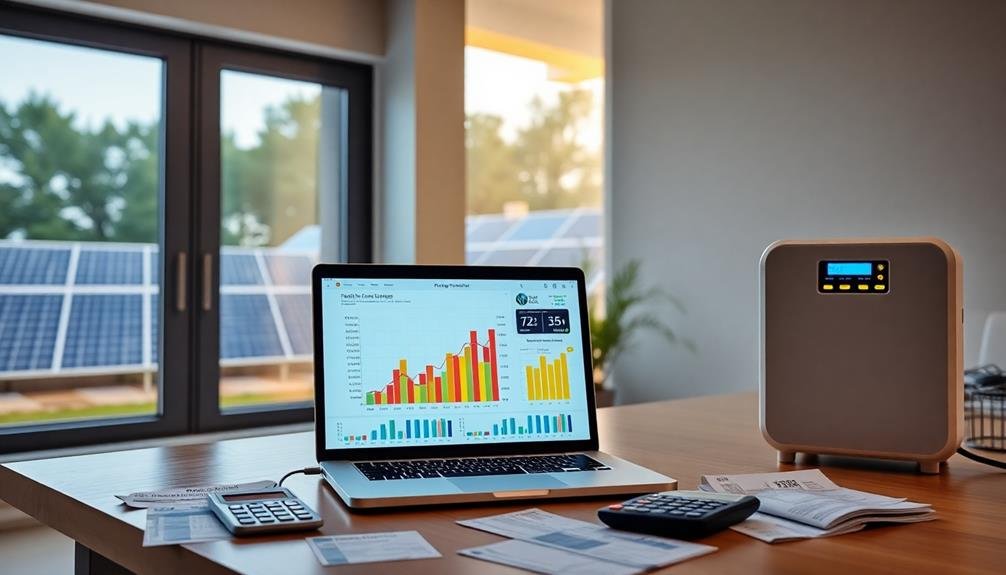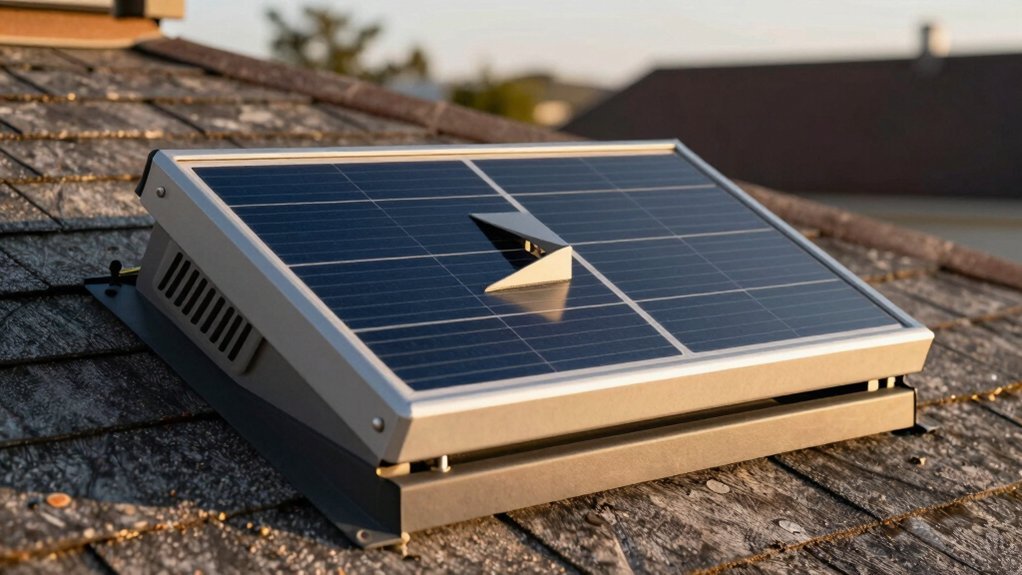When considering fuel cell technology for your home, savings calculators can help you make an informed decision. Top options include the Ballard Power Systems Savings Tool and Doosan Fuel Cell Calculator, both designed specifically for residential use. They factor in your local climate, energy rates, and available incentives. The FuelCell Energy Cost Estimator and Plug Power Fuel Cell Calculator offer versatile assessments for various scales, including homes. While Bloom Energy's calculator is primarily for commercial use, it provides detailed projections on potential savings and environmental impact. Exploring these tools will give you a clearer picture of how fuel cells could benefit your household.
Bloom Energy Savings Calculator

Bloom Energy offers a thorough savings calculator to help businesses estimate their potential cost reductions with fuel cell technology. This online tool allows you to input specific details about your company's energy consumption, location, and current utility rates to generate a customized savings projection.
To use the calculator, you'll need to provide information such as your annual electricity usage, peak demand, and average utility costs. The tool also considers factors like your industry type and facility size to guarantee accurate results.
Once you've entered all the required data, the calculator will generate a detailed report outlining your potential savings over time.
The Bloom Energy Savings Calculator doesn't just focus on cost reductions. It also provides estimates for reduced carbon emissions and improved energy reliability. You'll receive a breakdown of potential savings in various categories, including electricity costs, demand charges, and maintenance expenses.
While the calculator is user-friendly, it's significant to mention that it's primarily designed for commercial and industrial applications. Bloom Energy's fuel cells are typically used in larger-scale installations, so this tool may not be suitable for individual homeowners looking to assess residential fuel cell savings.
FuelCell Energy Cost Estimator
Moving from Bloom Energy's commercial focus, let's explore another key player in the fuel cell industry. FuelCell Energy offers a cost estimator tool that helps you gauge potential savings from implementing their fuel cell solutions. Unlike Bloom's calculator, which caters primarily to large businesses, FuelCell Energy's estimator is more versatile, accommodating various scales of operation.
You'll find the FuelCell Energy Cost Estimator user-friendly and informative. It asks for key details like your current energy consumption, electricity rates, and desired capacity. The tool then calculates potential energy savings, emissions reductions, and financial benefits over time.
It's particularly useful if you're considering fuel cells for distributed generation or combined heat and power applications.
One standout feature is the estimator's ability to factor in local incentives and rebates, giving you a more accurate picture of your potential return on investment.
However, keep in mind that the tool provides estimates based on average data. For a more precise assessment, you'll need to consult directly with FuelCell Energy's representatives. They can provide a detailed analysis tailored to your specific circumstances and energy needs.
Plug Power Fuel Cell Calculator

Let's turn our attention to another valuable tool in the fuel cell industry: the Plug Power Fuel Cell Calculator. This online resource helps you estimate potential savings and environmental benefits when switching to fuel cell technology for your home or business.
The calculator asks for your current energy usage, local electricity rates, and fuel costs. It then compares these figures to the efficiency and output of Plug Power's fuel cell systems. You'll receive a personalized report detailing projected energy savings, reduced carbon emissions, and return on investment timelines.
One of the calculator's strengths is its ability to factor in various fuel types, including natural gas, propane, and hydrogen. This versatility allows you to explore different scenarios based on fuel availability in your area.
The tool also considers government incentives and tax credits, providing a more accurate picture of your potential savings. You can adjust parameters like system size and runtime to fine-tune your results.
While the Plug Power Calculator offers valuable insights, remember it's designed to promote their products. Always cross-reference results with other calculators and consult energy professionals for a thorough analysis before making decisions.
Ballard Power Systems Savings Tool
Another key player in the fuel cell industry, Ballard Power Systems, offers its own savings calculation tool. This online calculator helps you estimate potential cost savings when switching to fuel cell technology for your home energy needs. You'll input basic information about your current energy consumption, local utility rates, and the size of your property to get started.
The Ballard tool stands out by considering factors like your region's climate and seasonal variations in energy demand. It also takes into account the specific characteristics of Ballard's fuel cell systems, ensuring more accurate projections for their products. You can adjust variables like fuel costs and electricity prices to see how they impact your long-term savings.
One unique feature is the tool's ability to compare different fuel cell configurations, allowing you to find the ideal setup for your home. It also factors in potential government incentives and rebates, giving you a more thorough view of the financial benefits.
The calculator provides a detailed breakdown of your projected savings over time, including payback periods and return on investment estimates. This information helps you make an informed decision about adopting fuel cell technology for your home.
Doosan Fuel Cell Calculator

Doosan Fuel Cell America offers a thorough savings calculator for homeowners interested in fuel cell technology. This user-friendly tool allows you to input specific details about your energy consumption and costs, providing a personalized estimate of potential savings with a Doosan fuel cell system.
You'll find the calculator easy to navigate, with clear instructions guiding you through each step. It takes into account factors such as your current electricity rates, natural gas prices, and annual energy usage.
The tool then calculates your potential savings over time, considering the initial investment and ongoing maintenance costs.
What sets Doosan's calculator apart is its ability to factor in:
- Environmental impact, showing you the reduction in carbon emissions
- Government incentives and tax credits specific to your location
- Potential revenue from selling excess energy back to the grid
Frequently Asked Questions
How Do Fuel Cells Compare to Solar Panels in Terms of Efficiency?
You'll find that fuel cells are generally more efficient than solar panels. They convert up to 60% of fuel into electricity, while solar panels typically max out at 20-25%. However, solar's efficiency is improving rapidly.
What Are the Environmental Impacts of Using Fuel Cells at Home?
You'll find fuel cells have minimal environmental impact at home. They produce clean electricity with water as the main byproduct. However, they still rely on hydrogen production, which can have upstream environmental effects depending on the source.
Are There Government Incentives Available for Installing Residential Fuel Cells?
Yes, you'll find various government incentives for residential fuel cells. These can include federal tax credits, state rebates, and local utility incentives. Check with your state's energy office or the Database of State Incentives for Renewables & Efficiency for specifics.
How Long Does a Typical Home Fuel Cell System Last?
You can expect your home fuel cell system to last between 10 to 20 years. It's important to maintain it properly. You'll likely need to replace the fuel cell stack after about 5 years, depending on usage.
Can Fuel Cells Be Used as a Primary Power Source for Homes?
Yes, you can use fuel cells as your home's primary power source. They're reliable and efficient, providing continuous electricity. You'll need to guarantee a steady fuel supply and meet local regulations. Consider costs and maintenance requirements before committing.
In Summary
You've explored five high-quality fuel cell savings calculators from industry leaders. Each tool offers unique features to estimate your potential savings with home fuel cell technology. By using these calculators, you'll gain valuable insights into the financial benefits of adopting fuel cells for your home energy needs. Don't hesitate to try multiple calculators to get an extensive view. Remember, the more informed you are, the better equipped you'll be to make a smart, cost-effective decision about fuel cell adoption.





Leave a Reply